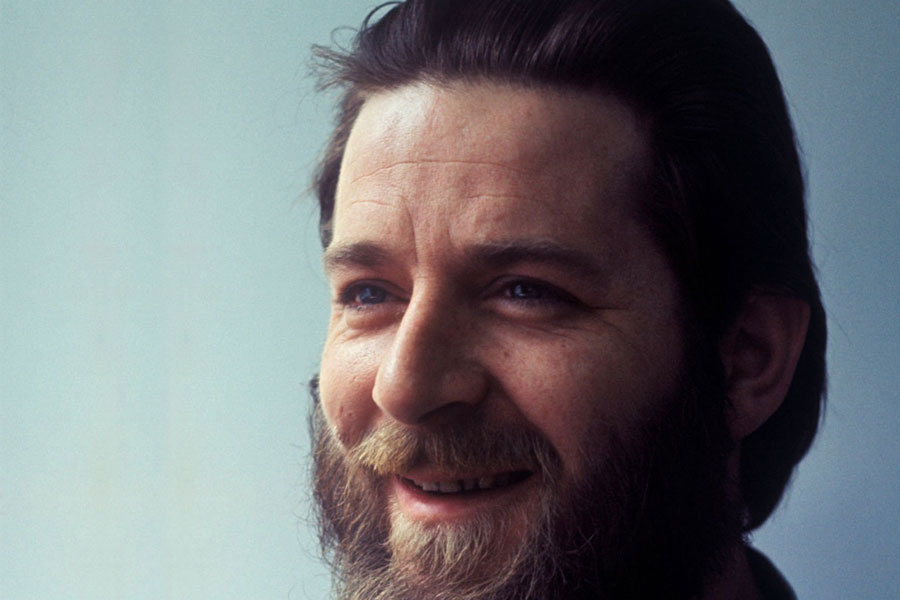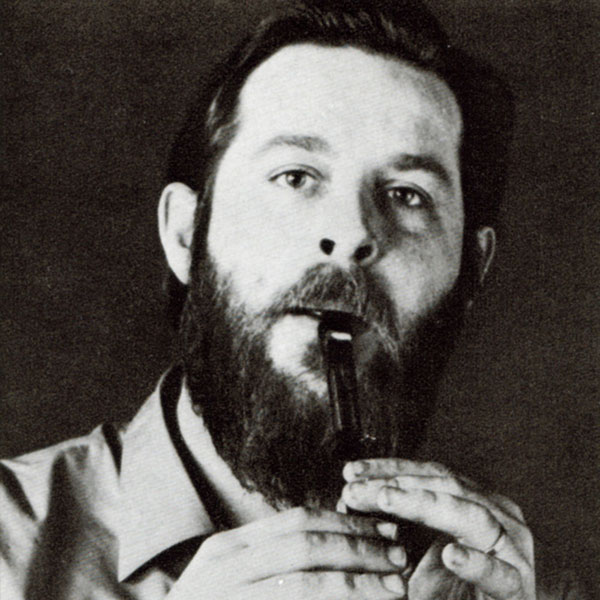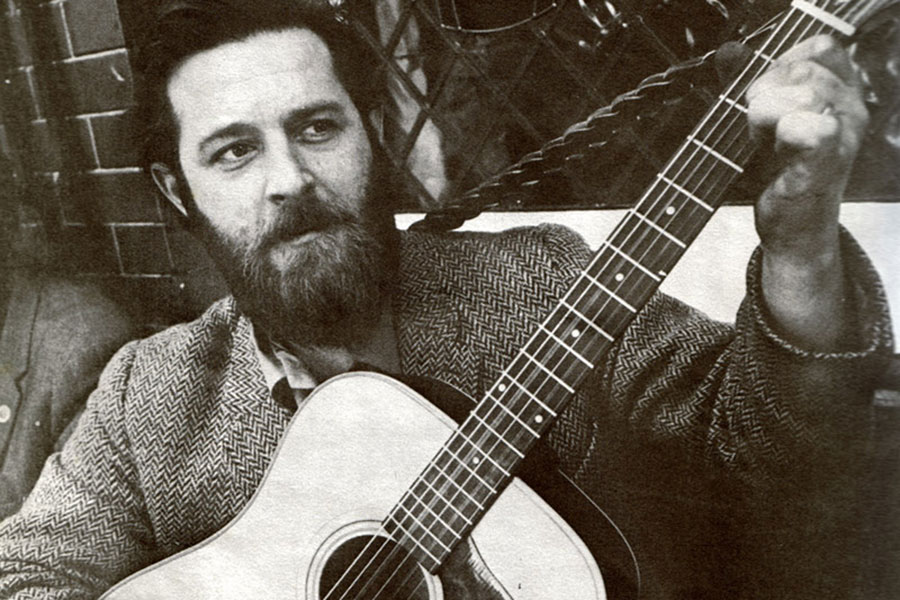


Ciarán was born in Dublin on 18 February 1936. His father, a doctor, was in practice in the City. The children had an Irish-speaking nanny. Ciarán's early exposure to his native tongue was continued when he went to Colaiste Mhuire in Parnell Square for his education. Schooldays over he went on to University College Dublin for a course in Agricultural Science. He did not take his degree but has always retained an interest in farming. He drifted into the musical and theatrical world of Dublin in the early Sixties and began following a different star.
Ciarán married Jeannie Bonham on 5 April 1964. They have six delightful daughters who from birth almost have been completely bi-lingual. The girls are Ciara, Laoighse, Siobhra, Rathfionna, Saoirse and Seodhna.
The family live in a Georgian house out in the Dublin mountains which commands a superb view out over Dublin city and the sweep of the bay.
source: The Dubliners Scrapbook (1978)
1974 began well with no hint of the cataclysm which was to follow shortly…

On 2 April there was a concert at the Royal Albert Hall in London. A television camera team from Ulster Television was backstage filming for a a documentary feature on Phil Coulter, which was shown in Ireland subsequently on a number of occasions.
Ciarán was in particularly good form both on and off stage. In retrospect that fact seems very poignant.
The night of 5 April 1974 was little short of catastrophic. It began much as usual. The Dubliners travelled down to Eastbourne where they were appearing in concert. They began the performance and as the first half proceeded Ciarán slipped backstage at every available opportunity. Luke was worried by the way Ciarán kept moving his head about, as if he was trying to alleviate increasing pain. After the interval, in spite of the advice of the other four, Ciarán insisted on going back on stage. Four minutes afterwards however he had to admit defeat. He could not carry on. Luke insisted that a doctor should be phoned and instructed to await their return to the Irish Club at Eaton Square. The roadie for the trip, John Corry, thought that it was better to drive straight to St. George's Hospital at Hyde Park Corner. The trip was accomplished in record time. There the doctors diagnosed a brain aneurys m.
The following afternoon I arrived at the Irish Club in Eaton Square to accompany the Dubliners to Chatham as had been arranged previously. Gloom pervaded the entire establishment. Luke told me the news; Ciaran's life was now in the balance. Ronnie was not going to travel with the party. He was going to Heathrow Airport to meet Ciaran's wife Jeannie who was due to return home from a holiday in Ghana. He would follow on later. Arrived at the Central Hall, Chatham, it was decided that the best thing was to tell the audience the simple truth about Ciaran's illness.
Ronnie arrived to say that Jeannie was not aboard the aircraft. Later it was found that she had decided to prolong her holiday by a few days and had gone off on a trip with a group of folk musicians. It was to be the middle of the following week before word could be got to her. Then it took her thirty-six wearisome hours and six flights to bring her from Accra to London.
Meanwhile Ciarán had been transferred to the Atkinson Morley Hospital in Wimbledon. The doctors were waiting for Jeannie's signature before operating. She was told that there was danger of further haemorrhaging. If it was severe it would kill him, less bleeding and he would be incapacitated to a greater or lesser degree for the rest of his life. Ciarán was operated on at the earliest opportunity. The bleeding began again while he was on the table which meant that they could not repair the damage, just staunch the bleeding. This left him paralysed down the left side and very confused as to where he was and what had happened.
The Atkinson Morley Hospital is experienced in coping with celebrities. Stirling Moss was treated there when he crashed his racing car at high speed some years back. Nevertheless they had difficulty in coping with the stream of phone calls and visits from friend and stranger alike. All of them wanted to show that they cared very deeply about what was happening to Ciarán and hoping and praying for his complete recovery. In due course a second operation was performed. Afterwards he was still suffering from paralysis but gradually his condition improved until he was fit enough to be sent back to Hyde Park Corner for some weeks. Jeannie had meanwhile returned home to Dublin. She came back to London bringing four of their six daughters with her. Ciarán was allowed out of the hospital for a couple of hours each day. In due course he was sufficiently recovered to be transferred to the Wolfson Centre in Wimbledon for a course of intensive therapy. This was a difficult time for he was very homesick for Ireland and the Dublin Mountains. However he worked hard and gradually his condition improved until at the end of August he was allowed to return to Ireland.
Ciarán kept the therapy up by attending a clinic in Dun Laoghaire, County Dublin. He was sufficiently heartened by his progress to insist on rejoining the Dubliners on their next tour of the Continent in November.
…Ciarán's continued insistence that he was fit enough to join them on the forthcoming German tour was causing them considerable disquiet. It was felt that it would be preferable for him to ease himself back to work, with a few gigs in Ireland say, rather than plunging in at the deep end. Like-a lot of quiet, easygoing people, Ciarán would not be gain-sayed once he had determined on a course of action.
…Jim (McCann) wrote from Germany: "My first Continental tour with the Dubs has been a great success so far.
As you know, Ciarán has come with us. He sings a couple of songs in the second half, and knocks them dead when he makes his way out on stage supporting himself on a huge shepherd's crook. I think he's enjoying himself hugely. I am anyway".
The tour gradually began to take its toll of Ciarán, and it was reluctantly decided that for the sake of his health he should return home. He flew from Brussels to Dublin.
source: The Dubliners Scrapbook (1978)
Ciarán Bourke passed away on May 10, 1988…

Founder of Dubliners
Ciarán Bourke, a ballad singer, guitarist, and tin-whistle playing founding member of the Dubliners folk group, died Tuesday in Dublin. He was 48.
Founded in 1962 by Bourke and four fellow Irishmen, the group gained fame in Britain, the United States, Australia, and New Zealand and their homeland for their earthy, raucous style and folk songs.
Bourke, who left the group in 1974 after suffering a brain hemorrhage that left him partially paralyzed, collapsed Sunday because of another brain hemorrhage.
Bourke, who became an antiques dealer when his music career ended, played with the group in a special 25th anniversary celebration broadcast on Irish television in 1986.
The Dubliners songs include "The Town I Love So Well," "The Molly Maguires," "Dirty Old Town," and "Seven Drunken Nights."
Many of their songs are accompanied by banjo, guitar, and the tin whistle, a six-holed metal Instrument.
Bourke translated many of the group's ballads from the original Gaelic into English.